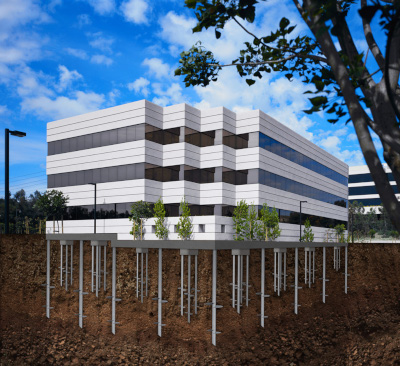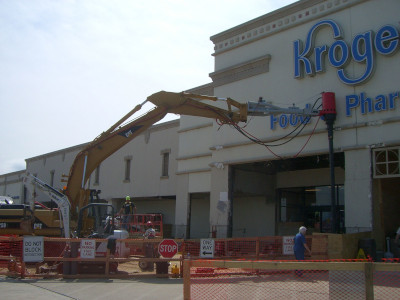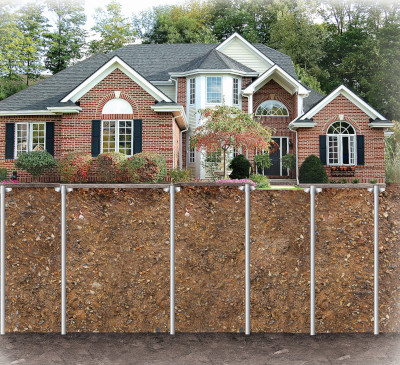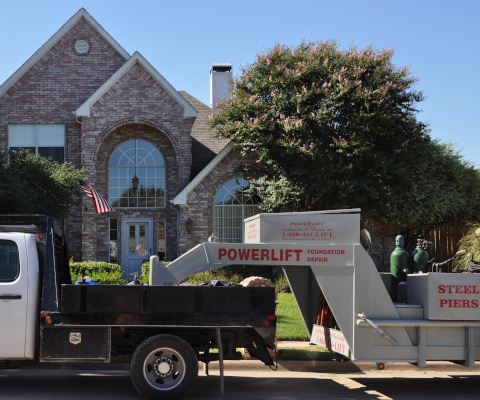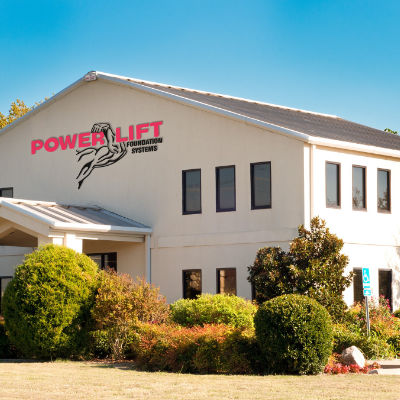Foundation Repair Services in Columbia Missouri for Your Home
Foundation Repair in Columbia, Missouri
In Missouri, we experience all four seasons and unfortunately, they typically occur within the same week. Because of this, the level and amount of water present at any given time fluctuates significantly. Regardless of what the weather is like, the clay beneath your home and foundation will react. If you live in the area, you know that clay is very problematic, expanding and contracting when in the presence or absence of water.
Have you recently noticed cracks on the outside of your building near windows, bowing walls, leaks, or dampness near your foundation or inside your crawl space? If you answered yes to any of those questions, we urge you to give the expert technicians from Power Lift Foundation Systems a call so that we can assess your situation and present a solution.
Maybe you’ve even noticed indicators inside your home without realizing it. Doors might not close all the way, floors are uneven, cracked tiles, uneven steps, or cracks in the drywall. This is due to your buildings’ foundation shifting to a degree that is outside of the tolerance of normal expansion and contraction that we normally see in Columbia. Any of these symptoms are a reason to have your foundation health reviewed by an expert structural technician.
Ignoring symptoms such as these can lead to major problems in your Columbia home or commercial property. We advise you to address these issues right away, this can not only mitigate the cost of repair, but it can save you from the hassle of dealing with collapsed foundations, flooding and more.
Keep in mind that leaving any of the above symptoms unassessed or untreated can accelerate or exacerbate the problem due to the volatile weather conditions in the region.
If your foundation needs repair in the Columbia area, our team is nearby and ready to help. We’ll assess the issue, discuss the solutions available to fix the problem, and get to work. Having put in two decades worth of research and experience, Power Lift Foundation Systems has become a pre-eminent company within the industry, serving residential and commercial clients. Few companies in the foundation repair industry hold patents for products and equipment that they have developed themselves. At Power Lift, we don’t have one patent — we have seven patents for pile driving and foundation support systems!
Learn more about our proprietary technologies using the links below:
- Building Foundation Stabilizing And Elevating Apparatus — May 15, 1990
- Foundation Slab Support And Lifting Apparatus — Oct. 13, 1992
- Foundation Slab Support And Lifting Apparatus — April 27, 1993
- Structural Slab Lifting and Stabilizing Apparatus — December 14, 1993
- Seismic Shock Absorbing Pier— November 9, 1999
- Pier Driving and Foundation Lifting Assembly — Oct. 27, 2008
- Assembly for straightening a basement wall — March 20, 2012
Columbia Foundation Repair and Lifting
When it comes to installing foundation support, Power Lift’s vast experience and deep engineered steel pile systems are unrivaled in performance and benefits.
Our industry-leading line of driven and helical steel pile foundation support products are installed deep, meaning they’re able to reach rock or a suitable bearing stratum that will provide long term, permanent support for your home’s foundation.
Unlike competitors that use cheap, shallow concrete piers, or inferior thin wall steel piers, Power Lift routinely drives piles 30’ deep or more to reach rock or permanent bearing strata.
These competitors push short 1’ concrete cylinder or 3’ steel sections usually to a depth of 4’ to 8’. At this depth, their piers will certainly fail because they are not deep enough. The 6” diameter of a concrete cylinder builds too much friction to allow them to reach suitable depths. As well, inferior thin wall steel will not withstand the required driving force to penetrate tough soils and reach a stable bearing stratum.
Power Lift’s highly engineered and patented hydraulic system drives long sections of steel tube through our steel foundation support brackets. Our steel sections are typically 6’-8’ and are often much longer. Our patented system uses high capacity hydraulic cylinders to smoothly drive the pile sections to the proper depth.
Now let’s talk about Lifting!
Whether driven or helical steel piles are utilized, after all piles have been installed, Power Lift’s unified lifting system will be set in place at all pile locations. Using the elevation data obtained, the foundation will be raised gradually and uniformly just as the foundation moved when settlement occurred.
Structures almost never settle the same amount at all points, so as Power Lift’s foreman raises the structure, he continually monitors the elevation at each pile. As a pile reaches the desired amount of lift, the pile’s lift system will be terminated so it does not raise the foundation any higher.
This process continues until the lowest point reaches the target grade. Once the structure reaches the target elevation at all pile locations, the piles are permanently secured to the foundation support brackets in the elevated position ending the lifting process.
By raising your home using Power Lift’s synchronized lifting system we are able to offer the greatest restoration from lifting. And, unlike workers using bottle jacks and unevenly raising your home, Power Lift’s synchronized system does not cause unnecessary cracking or additional damage.
Drainage Correction and Waterproofing
Did you know that improper and insufficient storm water removal can cause movement of your home’s foundation?
This movement is generally the result of excess moisture being absorbed by the expansive clay soil. As the moisture is absorbed, volumetric expansion of the clay occurs which produces a swell force that can easily cause a foundation to move upward. In the industry, we refer to this type of soil movement as “heave”.
In most cases, heave is usually caused by the following:
- Poor or improper drainage around the foundation
- Plumbing leaks beneath the foundation
- Moisture present from springs or other underground sources
- Over-watering or improper irrigation
Power Lift solves such foundation issues by implementing one of the following.
- Landscape grades should be kept a minimum of four (4”) inches below the top of the finished floor on the main level — and should slope away from the foundation at a minimum of one (1”) inch per foot for six (6’) feet. Use moderately plastic clayey soil to fill in areas needed to maintain these grades — sand and topsoil should be avoided. In addition, re-cutting or regrading of the area around the foundation is often necessary. The goal is to promote rapid dissipation of storm water away from the foundation. In some cases, inadequate elevation changes around the structure make water discharge via conventional methods impossible. For sights such as these, a below grade water collection and dispersing system will be required.
- For sights with insufficient fall, a better option to regrade is to design and install a below grade water collection system. This system should be non-perforated, and should collect all of the water being discharged from the downspouts. As well, inlets should be positioned in low areas to collect water trapped near the foundation. If it is determined that subsurface moisture is flowing and accumulating near the foundation, an aggregate-incased perforated drain system is often required. This type of system is sometimes referred to as a “French drain”. Frequently, systems such as these will require a collection basin and sump pump to adequately discharge the collected water. Also, it is imperative that perforated drain lines not be used to collect transport surface or storm water from gutters.
To help avoid foundation issues from developing, we recommend doing all you can to control the seasonal variation of the soil’s moisture.
Here are our Top 5 Foundation Maintenance Tips.
Essential Crawl Space Repair Solutions for Your Home in Columbia, MO
All too often wood floor structures are neglected over time and suffer from deterioration and settlement. Few companies truly understand how to rebuild, repair, and support a residential home’s wood floor framing system. Power Lift’s experts know what it takes and how to repair this vital part of your home. Because the floor framing system of this type of home is ground supported, they suffer tremendously from the movement of unstable soils. They are also prone to hold water in the crawl space area which promotes deterioration of the joist, sills, and girders. Power Lift can resolve these problems by replacing/rebuilding of the deteriorated wooden members, shimming and leveling on top of existing masonry columns or offering deep support utilizing Power Lift’s Power Torque Helical steel pile.
Check out what one of our Columbia Clients have to say about us!
FREE Download: Buyer’s Guide!
Ready to schedule your Free Estimate? Simply want to learn more? We have put together an educational video series just for you!

